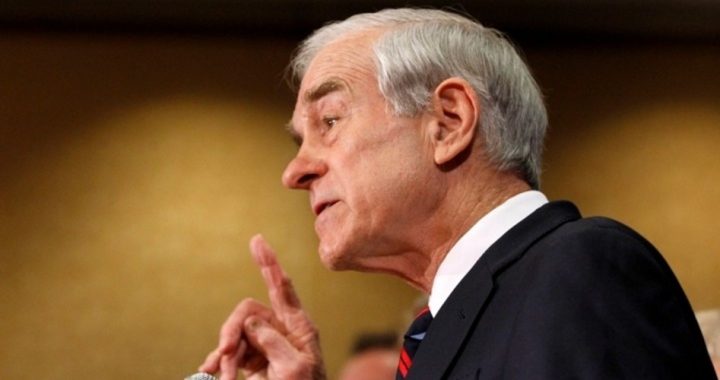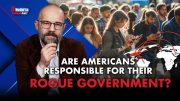
In his last public opportunity to quiz Federal Reserve Chairman Ben Bernanke, who appeared before the House Financial Services Committee on July 18, Texas Congressman and Republican presidential candidate Ron Paul took the time to put things into perspective:
For the past few years the Federal Reserve System has received criticism from all sides of the political spectrum, and rightly so, for its unprecedented intervention into the economy and its bailouts of large Wall Street banks and foreign central banks.
This has been Paul’s theme ever since he entered Congress following a special election in April 1976. In a position paper that his staff prepared in June of 1976, Paul attacked a pending bill in Congress to fund the International Monetary Fund following the breakdown of the Bretton Woods agreement when President Nixon took the dollar off the gold standard in 1971.
The staffer primarily responsible for that paper, Gary North, remembers starting work on Friday, June 11, 1976, and being given the task of preparing the paper in time for the Monday deadline. He worked all weekend on it, and when it was published, it made such an impression on Senator William Proxmire, then chairman of the Senate Banking Committee, that he invited Paul to testify before his committee. Says North: “At the time, I had never heard of a House member testifying to a Senate Committee. I have never heard of it since.”
But that testimony launched a three-decades-long campaign by that lone congressman to question the existing monetary system, especially the centerpiece of that system, the Federal Reserve.
In his July 18 testimony, Paul recalled his primary problem with the IMF — the same problem he has with the Fed — is that it is a central bank that was deliberately designed to enrich its supporters and friends in the banking system and protect them from the costs of making bad decisions, while impoverishing the middle class and the poor who pay those costs.
He said he has always been an opponent of the system and not the chairmen of the Fed, be they Volcker, Greenspan or Bernanke. “The system itself is flawed,” he said, and “more debt is never the answer.” He decried the lack of any attention by the Fed to the real market solutions to the continuing unending series of economic and financial crises that face the United States and now the rest of the world, namely “the work ethic, real savings, and real money.”
He said he wanted to “contribute to the conversation” and then asked the Fed chairman a series of questions:
Paul: Under the Constitution, who has the authority to manage monetary policy?
Bernanke: Congress has the authority but transferred it to the Fed in 1913.
Paul: But Congress doesn’t have the power to do that! That’s amending the Constitution! Mr. Chairman, who has the right of oversight [of the Fed]?
Bernanke: The Congress. We accept that, and the need for transparency. But it is a well-established fact that an independent central bank will provide better outcomes.
Paul: [But] the Fed operates in secret. Congress has a right to know, an obligation to know. Central banking destroys the middle class. The Fed is the facilitator for big government, financing wars [and it] eventually ends up in a crisis. [The] first step is transparency. We demand to know … trillions and trillions printed out of thin air. [You] keep doing the same thing: spending never ends, wars never end.
Bernanke: All of our actions have been fully disclosed.
***
At this point the reader needs to remember that what limited disclosure the Fed has allowed has only come following congressional action and court demands. The Fed never supported transparency, but disclosed only when it was forced to.
Paul then clarified the difference between his position and that of the Fed. It starts with definitions. The most beaten up word in the economic language is the word “inflation” and next to it is its sister, “deflation.” Back to the testimony:
***
Paul: The need to prevent deflation is one of the purposes of the Fed, right?
Bernanke: Yes.
Paul: But [increasing the money supply] never allows the markets to clear. You’ve done a pretty good job [with that]! M1 [a measure of the supply of money in the economy] has grown by 16 percent [in the last year while] M2 [a broader measure] has grown by over 9 percent. Do you consider the decline in house prices as deflation?
Bernanke: No. Inflation is increases in [the] prices of goods and services.
Paul: [That’s] one of the problems in our discussion — the meaning of words and what the words inflation and deflation mean. Because by my definition inflation and deflation is when the supply of money increases or decreases. If [you’re] watching changes in house prices and goods and services, you’re watching the wrong thing.
***
As his time was running out, Paul saved the best for last: Given the Fed’s failure to restart the economy despite massive interventions and floods of dollars, Paul asked if Bernanke would ever consider changing his mind about monetary policy.
***
Paul: We’ve had this [economic crisis] for five years and we’re still in a mess. In another five years, if we’re still in the same mess, would you reassess your convictions?
Bernanke: Of course. I would draw conclusions from that new information.
Paul: [Your] inflation demands corrections and the market wants to correct [but it can’t]. Is this different from 1945?
Bernanke: Yes.
***
Point made: Circumstances have changed since 1945, but Bernanke’s convictions and ideology haven’t changed. It was so typical of Paul to point out Bernanke’s inconsistencies without the histrionics.
In a final farewell statement about the Fed, Paul wrote:
Without the Fed, interest rates would rise to such levels that the federal government would have no choice but to curtail its expenditures and focus only on doing what is truly necessary.
With market discipline allowed to prevail, the size of the federal government would be drastically smaller. If Congress were really serious about limiting the size of government, it would eliminate the most important enabler of government profligacy by ending the Fed.
In his farewell address to the joint session of Congress on April 19, 1951, General Douglas MacArthur said:
I am closing my 52 years of military service. When I joined the Army, even before the turn of the century, it was the fulfillment of all of my boyish hopes and dreams. The world has turned over many times since I took the oath on the plain at West Point, and the hopes and dreams have long since vanished, but I still remember the refrain of one of the most popular barrack ballads of that day which proclaimed most proudly that “old soldiers never die; they just fade away.”
And like the old soldier of that ballad, I now close my military career and just fade away, an old soldier who tried to do his duty as God gave him the light to see that duty. Good bye.
With the fading away of Congressman Ron Paul from the political scene, his quizzing and challenging of the Federal Reserve and its chairmen may have come to an end, but the fight to remove the cancer of central banking and its current manifestation, the Federal Reserve System, continues.
To view the three-part video of Paul’s testimony, click here.
Photo of Rep. Ron Paul: AP Images



